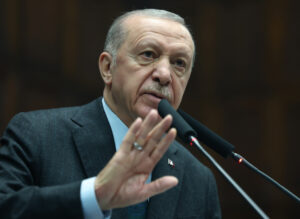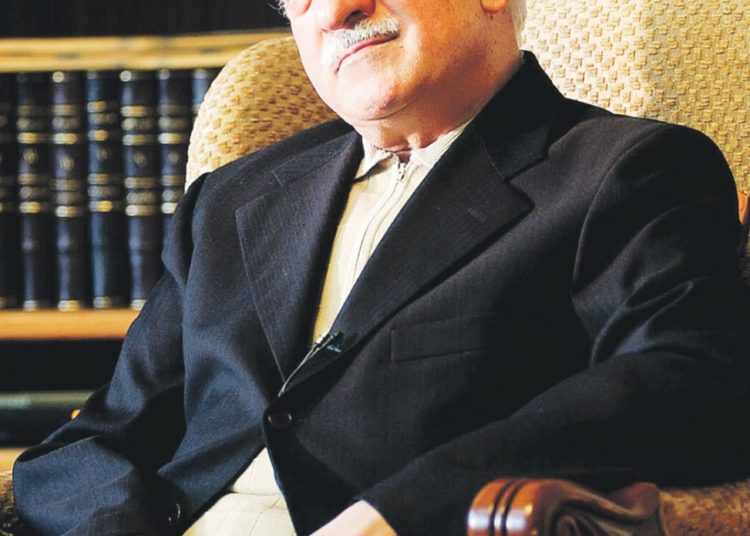Abdullah Bozkurt/Stockholm
In a shocking and politically motivated posthumous legal action, Turkey has issued an arrest warrant for a deceased critic of President Recep Tayyip Erdogan, while keeping dozens of previous warrants against him active. This unprecedented move marks a disturbing new phase in the extreme politicization of Turkey’s judicial system, where even the deceased are not exempt from the state’s abuse of power.
Fethullah Gülen, a Turkish Muslim scholar who had faced persecution by the Erdogan regime for his refusal to support the president’s divisive, political, Islamist agenda, is still deemed to be alive by the Turkish judiciary, which has been weaponized under Erdogan’s rule to target critics, opponents and dissidents.
According to a confidential government communiqué obtained by Nordic Monitor, a new arrest warrant was issued for Gülen by a high criminal court in Ankara in 2025, despite his passing on October 20, 2024, in the United States, where he had lived in self-imposed exile since 1999.
The communiqué also reveals that numerous outstanding arrest warrants issued for Gülen by various courts across Turkey, under directives from President Erdogan, remain active and await execution by law enforcement agencies.
While autocratic regimes have historically issued arrest warrants for deceased individuals to sustain intimidation campaigns, undermine legitimate opposition and maintain their suppression of dissident groups, Turkey’s actions appear unprecedented. There is no recent parallel in Turkish history concerning prominent figures who are no longer alive.
The Turkish government’s communiqué regarding Fethullah Gülen lists outstanding arrest warrants, including one issued in 2025, months after his death:
Treating Gülen as alive and issuing a posthumous arrest warrant does not seem to reflect bureaucratic dysfunction but rather a deliberate strategy by the Erdogan government, which has introduced a new tool in its arsenal of suppression: charging the deceased and continuing their persecution after death.
Gülen’s death was announced within hours by his family, who stated that the cleric passed away at St. Luke’s Hospital in Pennsylvania due to multiple health complications. Both his personal doctors and the attending physician at St. Luke’s confirmed his passing and provided details about the cause of death. His movement organized a public funeral service attended by tens of thousands at a football stadium in New Jersey.
At the request of the Turkish government, the US State Department forwarded the St. Luke’s Hospital document certifying Gülen’s death at its Monroe Campus in Pennsylvania to the Turkish Foreign Ministry on February 1, 2025. As a result, his death was officially registered in Gülen’s population registry (Nüfus kaydı in Turkish) in Turkey, a copy of which was also obtained by Nordic Monitor.
Yet, this registration did not prevent Turkish authorities from pursuing charges against Gülen, keeping the outstanding arrest warrants active, and even issuing a new one against him this year. According to the communiqué the Ankara 14th High Criminal Court ruled to issue an arrest warrant under decision No. 2025/55. The existence of this and other active arrest warrants against Gülen has created confusion among law enforcement agencies tasked with executing them.
A young lieutenant stationed at a small garrison in Turkey’s Korkuteli district blew the whistle on this bizarre practice. On February 20 he wrote a letter expressing concern about the continuation of arrest warrants for Gülen despite his death, arguing that it created an unnecessary burden on law enforcement agencies.

“If the individual in question [Gülen] is still being sought by law enforcement, it would result in a waste of resources, effort and time. Therefore, I respectfully inform you that the aforementioned individual is deceased,” wrote Vedat Kilinç, a first lieutenant in the gendarmerie and district commander in Korkuteli. The letter was sent to numerous courts and prosecutor’s offices across Turkey, but so far, no action has been taken regarding the complaint.
Issuing an arrest warrant against Gülen is clearly not just an administrative oversight but a calculated move by the Erdogan government, which has gained a reputation for weaponizing the legal system to control narratives, suppress opposition and legitimize past and ongoing crackdowns. In doing so, Erdogan and his far-right nationalist allies believe they are reinforcing the regime’s authority in Turkey.
The Turkish judiciary, following mass, arbitrary and summary purges between 2015 and 2017, has lost its status as an independent and impartial institution. Instead, it has become a mere extension of Erdogan’s regime.
The Turkish government communiqué reveals that arrest warrants began to accumulate against Gülen in 2015, following a series of rapid changes in Turkish courts enacted through fast-tracked laws by the Erdogan government. These changes resulted in the establishment of special courts overseen by Erdogan loyalists, with more warrants issued in 2016 and subsequent years.

President Erdogan even took his fight against his chief critic abroad, asking the US to extradite Gülen. Since 2015, his government has submitted multiple extradition requests to US authorities based on fabricated charges. However, the US Justice Department has consistently denied these requests, citing a lack of credible evidence to support the Turkish claims.
Gülen’s teachings inspired a global volunteer network focused on education, interfaith dialogue, charitable initiatives and social empowerment. He opposed the manipulation of Islam by Erdogan and his Islamist associates, rejected Erdogan’s offer to utilize the movement’s global school network to promote a divisive, political, Islamist agenda, and strongly criticized Erdogan for cooperating with radical and jihadist groups.
The frivolous indictments against him cited his meetings with rabbis and priests, including Pope John Paul II at the Vatican in 1998, as criminal evidence justifying a lengthy prison sentence. Erdogan publicly denounced interfaith dialogue activities, asserting that there cannot be a dialogue between Islam and Christianity.
The Wall Street Journal’s June 2010 interview with Gülen, in which he criticized the controversial, jihadist-linked Turkish charity group the Foundation for Human Rights and Freedoms and Humanitarian Relief (IHH) — the organization behind the Mavi Marmara flotilla in 2010 — was another piece of criminal evidence cited against the cleric.
Gülen lambasted the IHH for failing to obtain Israel’s consent before embarking on their aid mission, which led to a deadly confrontation. Some activists aboard the ship clashed with Israeli forces during the raid, resulting in the death of eight Turks and one dual Turkish-US national.
The IHH works closely with MIT, the Turkish intelligence agency, and has been regarded as a global logistics supplier for radical jihadist groups, including al-Qaeda.
As a result of these criticisms and outreach efforts with other faith groups, Gülen and his movement incurred the wrath of Erdogan’s repressive government, enduring a decade-long crackdown that shows no signs of abating even today. Gülen and his followers faced politically motivated charges, with nearly a million people subjected to legal action in Turkey for their alleged ties to the movement. Tens of thousands were imprisoned without due process and endured unfair trials.
Gülen’s population registry indicates that he was registered as deceased on October 20, 2024, in the US:
The turning point came in December 2013, when Erdogan abruptly labeled Gülen’s movement a terrorist organization after corruption investigations revealed the president’s close ties to Iranian sanctions violator Reza Zarrab and former Saudi al-Qaeda financier Yasin al-Qadi. Denouncing the charges as a judicial coup, Erdogan secured the release of all detained suspects, dismissed police chiefs and prosecutors en masse and accused the movement of orchestrating the probes — a claim that Gülen consistently denied.
The Erdogan government also blamed Gülen for a coup attempt in 2016, despite the emergence of multiple pieces of evidence suggesting it was a false flag operation orchestrated by Erdogan’s intelligence and military chiefs. This operation aimed to criminalize the Gülen movement, transform the country’s governance into a near-absolute presidential system and pave the way for a military incursion into Syria.
Using fabricated charges, the Erdogan government seized tens of billions of dollars’ worth of assets from individuals and entities alleged to be associated with the Gülen movement. This move is viewed as a redistribution of wealth to Erdogan’s cronies and associates, who have profited from unlawfully seized companies and personal assets.
There are no signs of the crackdown on the Gülen movement abating. Even today, hundreds of people in Turkey are rounded up by the police each week on accusations of alleged ties to the movement, which continues to bear the brunt of the Erdogan government’s suppression of the opposition.
Turkey’s introduction of the practice of issuing arrest warrants for deceased individuals indicates just how far the Erdogan government is willing to push its crackdown. It also serves as a troubling reminder of how Erdogan’s authoritarian regime manipulates legal structures to advance its own nefarious agenda.












